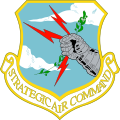English: Shield of the USAF Strategic Air Command
The insignia of SAC was designed in 1951 by A2C Robert T. Barnes (his statement and test question as a CMSgt and Assistant Commandant of the ADC NCO Academy 1970), then assigned to the 92nd Bombardment Wing. Submitted in a command-wide contest, it was chosen as the winner by a three judge panel: General Curtis E. LeMay, Commander-in-Chief, Strategic Air Command [CINCSAC]; General Thomas S. Power, Vice Commander-in-Chief, Strategic Air Command; and Brigadier General AW Kissner, Chief of Staff, Strategic Air Command. Staff Sergeant Barnes' winning design netted him a $100 United States Savings Bond.[1][2]
It has a sky-blue field with two white shaded blue-gray clouds, one in the upper left and one in the lower right extending to the edges of the shield. Upon this is a cubit arm in armor issuing from the lower right and extending toward the upper left part of the shield. The hand is grasping a green olive branch, and three red lightning bolts.
The blue sky is representative of USAF operations. The arm and armor are a symbol of strength, power and loyalty and represents the science and art of employing far-reaching advantages in securing the objectives of war. The olive branch, a symbol of peace, and the lightning flashes, symbolic of speed and power are qualities underlying the mission of the Strategic Air Command.[3]
The blue background of the SAC crest meant that SAC's reach was through the sky and that it was global in scope. The clouds meant that SAC was all-weather capable. The mailed fist depicted force, symbolized by lightning bolts of destruction. The olive branch represents peace.
In addition to the SAC crest, non-camouflaged SAC aircraft bore the SAC Stripe. The stripe consisted of a very dark blue background speckled with stars. The stripe appeared on the sides of SAC aircraft in the area of the cockpit on bomber aircraft and mid-fuselage on tanker and command post aircraft running from the top to the bottom of the fuselage at an angle from 11 o'clock to 5 o'clock. The stripe also appeared on ICBMs in the strategic missile force. The SAC crest was a bit wider than the stripe and was placed over the stripe. The stripe indicated that SAC was always ready to fulfill its mission.


